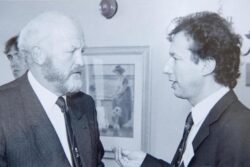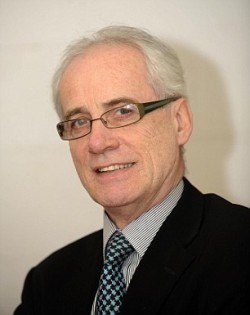Peter Jackson (President, Rugby Union Writers’ Club) pays tribute to life member Robin Davey, who has died suddenly at 77
When he retired after the 2011 Rugby World Cup in New Zealand, Robin Davey had filed running reports on just about every Wales match for almost 50 years.
For most of that time his blow-by-blow accounts, dictated by phone from Cardiff Arms Park, Twickenham, Murrayfield, Lansdowne Road and Paris, would hit the streets an hour or so later in Newport and far beyond, splashed all over the Football Argus.
They would have added up over the years, by my reckoning, to 12 Five-cum-Six Nations’ titles, eight Triple Crowns, six World Cups, four Grand Slams and three wooden spoons. The man himself may have queried the exactitude of the figures at which point it has to be said that mathematics was not his forte.

Having passed the dreaded eleven-plus entrance exam and been rewarded with a place at grammar school, the young Davey began a perennial struggle to grasp the rudiments of algebra, geometry and arithmetic.
In later life, he would tell the story of how Newport High School tried to find encouraging words in defiance of the exam results.
In the first year, Davey’s average mark for the three disciplines plunged the depths at barely 15 per cent. With masterly understatement, the school report concluded: “Finds the subjects difficult.’’
A set of similar results in the second year failed to extinguish the school’s faith in their pupil’s capacity for late development. The report read: “As yet, not a mathematician.’’
No improvement over the two subsequent years forced the school to abandon its faux optimism and replace it with one word of brutal reality. This time the verdict left no doubt: “Hopeless.’’
By the time his school gave up hope of turning him into a latter-day Archimedes, they had imbued him with a passion for rugby union as befitting an establishment whose alumni include the former Newport, Wales and Lions threequarters, David Burcher and Gareth Evans.
Even then there was no sign of the failed mathematician plunging straight into journalism. At a time when it was still the done thing for budding reporters to serve an apprenticeship on their local paper, Davey opted instead for a place at Lampeter University on a course specialising in biblical studies.

Nobody was ever too sure exactly what it entailed. According to his lifelong friend, Newport solicitor Roger James, Davey spent a lot of time trying to translate chunks of the Old Testament from Greek to English.
Whether that dissuaded him from becoming a theologian is not clear but his arrival at the South Wales Argus shortly afterwards suggested it did. He joined in 1965 at the age of 21 and stayed until his retirement 46 years later, bowing out at Eden Park in Auckland after Wales had gone within inches of making their first World Cup final.
He withstood the most severe test of all, time itself, to attain a longevity which made him one of the longest-serving sports journalists in the UK. His reign as the paper’s rugby correspondent, including a lengthy stint as sports editor, spanned the decades from the late 60s.
In that time he covered every minute of all four Welsh Grand Slams, the first three achieved by the all-star superstar cast of the 70s, including (Sir) Gareth Edwards, Barry John, Bobby Windsor, Graham Price, Charlie Faulkner, Terry Cobner, Gerald Davies, JPR Williams and his namesake, JJ.
Davey was on first-name terms with them all. No journalist knew more about the tribalism of Welsh club rugby for the simple reason that none spent more time in relentless pursuit of a story good enough to lead the back page.
He got more than his share because very little happened without his knowing about it.
He learnt at an early stage what it meant to be at the cutting edge of sports journalism, long before anyone began applying the phrase to technology. Davey found out for himself how cutting that edge could be, most starkly at Newbridge on the night the valley club scored a famous win over the mighty Newport.
As Davey approached, Hughes noticed that his inquisitor was wearing a Newport RFC tie, a black-and-amber rag to the Newbridge bull.Hughes took a pair of scissors from the sponge man’s bag and cut the offending item in half.
Eager to capture the home team’s jubilation, he knocked on the door of the home dressing room and asked Newbridge team secretary John Evans if he could have a word with the coach, Arthur Hughes.
As Davey approached, Hughes noticed that his inquisitor was wearing a Newport RFC tie, a black-and-amber rag to the Newbridge bull. Hughes took a pair of scissors from the sponge man’s bag and cut the offending item in half.
“Right, Robin,’’ he said amid guffaws of laughter. “We can start now. What is it want to know….?’’
Davey, too good a pro to let a little tom foolery distract him from the story, took it on the chin and ploughed on in pursuit of the story. He was never afraid to speak his mind.
His outspoken reaction to Newport losing at home to a 14-man Neath provoked a heated exchange with the Black-and-Ambers’ manager, Jim McCreedy.
The man from the Argus asked him whether he agreed that the performance was ‘a disgrace.’
The row provoked McCreedy into pointing to the home dressing-room and telling Davey: “You go in there and tell them you think they are a disgrace.’’
“No point,’’ came the reply. “The Football Argus will be out any minute. It’s all in there….’’
Robin Davey died suddenly earlier this month at 77, a few days before Wales’ opening defence of their Six Nations title in Dublin coincided with a no-show which he would have lambasted.
His funeral takes place at 1pm on Friday March 4 at St John’s Church in Risca Road, Newport. He is survived by his wife, Sue.
- Paul Weaver pays tribute to Roy Collins
- David Lacey RIP – tribute by Patrick Collins
- A tribute to Jimmy Greaves
- Martin Leach: a son’s tribute
- Simon Greenberg dies after short illness
- Ex-Telegraph man Graham Tait has died
- Peter Watson, a Fleet Street legend, departs
- Martin Johnson, master of the withering prose
- RIP Adrian Brown, tribute by son Oliver
